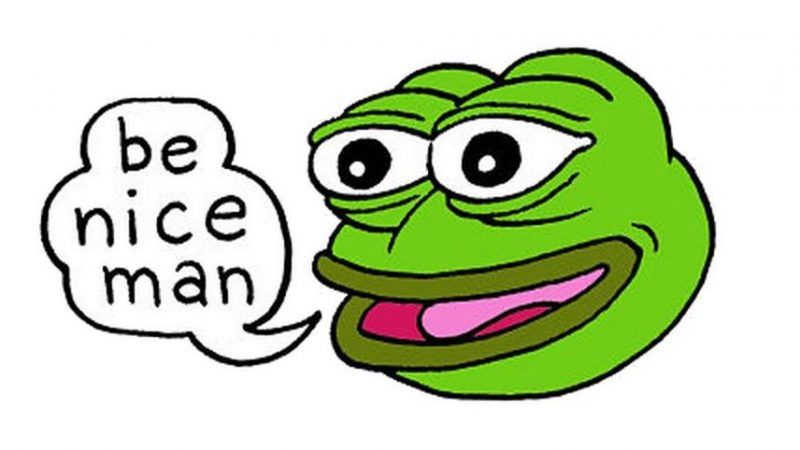Pepe the Frog Meets the Copyright Cops
When alt-right activists adopted this amphibian as their own, were they stealing a cartoonist's property or exercising free speech?


Artist Matt Furie created Pepe the Frog, but it was stranger corners of the Internet that honed the laid-back amphibian into a general-purpose meme, complete with what may be the most bizarre fictional backstory ever compiled for a cartoon character.
Katy Perry cemented Pepe's claim to Internet stardom in 2014 by tweeting a picture of Pepe crying. Another pop star, Nicki Minaj, followed suit a few weeks later. In October 2015, a presidential candidate named Donald Trump made Internet history by retweeting a Trumpish version of the frog. Pepe also was adopted as a mascot by less mainstream groups: the alt-right, the neo-Nazi website The Daily Stormer, and some less easy-to-characterize participants on 4Chan's and Reddit's message boards.
Pepe became the Internet's favorite non-feline animal meme because of the humble croaker's endearing plasticity. He could be reshaped into any necessary sentiment. Wendy's fast food restaurants invoked Pepe; so did the Russian embassy in London in an attempt to poke fun at British Prime Minister Theresa May.
At first, Furie encouraged Pepe aficionados to expropriate his creation. In 2015, he told The Daily Dot that he not only endorsed 4Chan's renditions of the frog but wanted other artists "to profit off of Pepe":
It is my job to help 4chan have the experience that they want without judgment or criticism. In the end, I want 4chan to feel they were supported by being heard, respected, and part of the decision-making process. Instead of promoting my own agenda, it is my goal to promote 4chan. Different things work for different people. Let me support you in the way you choose to draw Pepe….I believe in supporting people's decisions to profit off of Pepe in order to provide them with the most positive business experience possible.
In 2016, asked by The Atlantic what he thought of Pepe being "adopted by the so-called alt-right," Furie replied nonchalantly that: "My feelings are pretty neutral, this isn't the first time that Pepe has been used in a negative, weird context. I think it's just a reflection of the world at large."
Within a year, something changed. Perhaps it was a drumbeat of news reports tying the cartoon frog to white supremacists—reports helped along by teenaged trolls using fake identities. Or perhaps it was the left-leaning law firm of Wilmer Hale choosing to represent Furie for free. Whatever the reason, a legal campaign soon began. Threats or takedown requests went out to Reddit, Richard Spencer's AltRight.com, alt-right figure Baked Alaska, right-wing provocateur Mike Cernovich, Google Play, and Amazon.com, asking them to stop misappropriating Pepe. In October 2017, Furie sued a Missouri artist who drew original Pepe-themed artwork, alleging copyright violations. (They settled out of court.) He sued Alex Jones' Infowars.com for selling a poster that included an image of Pepe next to Donald Trump, Milo Yiannopoulos, and Ann Coulter. Earlier this month, The Daily Stormer agreed to remove all images of the comic frog.
"From our client's perspective, the message that he wants to make clear is that Pepe the Frog does not belong to the alt-right," Wilmer Hale partner Louis Tompros has told the ABA Journal.
It's zealous advocacy, but the law is another matter. Furie indisputably owns the copyright to the original Pepe comic strips that he drew in 2005. But fair use is a defense to other claims of infringement. The fair use test used by courts in copyright lawsuits weighs the purpose and character of the use, the nature of the work, the amount used in relation to the work as a whole, and the effect of the use on the potential market for the artist. All elements of that test appear to favor the Internet's remix culture, not Furie.
A handful of posters or artwork for sale aside, Pepe imagery is typically posted as part of non-commercial political or cultural expression. The effect on the commercial market for officially licensed Pepe images is negligible. If anything, Internet fame may increase demand for the official frog.
Free speech attorney Marc Randazza, who's representing Cernovich, says the frog can't be recaptured. "I believe things can be memed into the public domain," Randazza told Reason late last year. "You can take a whole bunch of already created works, and when you take them all together and then you blow new life into that and a new thought is expressed, you probably have engaged in what's called fair use." He says Pepe fits the bill.
Parody, including commercial parody, is constitutionally protected. In 1994, the U.S. Supreme Court decided a case where the copyright owner of Roy Orbison's song "Oh, Pretty Woman" sued the rap group 2 Live Crew over their song "Pretty Woman." Unlike 4Chan meme contributors, 2 Live Crew intended to profit from their parody, which explicitly copied lyrics and music from the original.
The Supreme Court decided in favor of 2 Live Crew unanimously. "Parody has an obvious claim to transformative value," the Court ruled. "It can provide social benefit, by shedding light on an earlier work, and, in the process, creating a new one….Parody, like other comment or criticism, may claim fair use….Whether, going beyond that, parody is in good taste or bad does not and should not matter to fair use."
A few years later, the U.S. Court of Appeals for the Second Circuit considered whether an advertisement for the immortal film Naked Gun 33 1/3: The Final Insult violated the copyright of photographer Annie Leibovitz. The ad recreated Leibovitz's 1991 Vanity Fair cover, which showed a naked photograph of the actress Demi Moore, who was pregnant at the time. In Paramount Pictures' version, the pregnant body had the face of actor Leslie Nielsen superimposed. Though the parody was commercial in nature, the court sided with Paramount.
Furie's original Pepe cartoons are rarely copied; rather, the frog's likeness is independently redrawn in a parody of the original. The original Furie-created Pepe is said to be a stoner, playing video games and eating pizza, with a catchphrase of "feels good man." If transforming that chill frog into a goose-stepping Nazi isn't parody, what is?
If Furie filed a trademark claim, that would have more stopping power. But the Patent and Trademark Office's online database shows that Furie's trademark to Pepe the Frog, with a first use in 2005, was "abandoned" in October 2016 and is now listed as "dead." Crucially, 2016 was when Furie took a laissez-faire view toward amphibian memes. By the time that Wilmer Hale stepped in to provide free lawyering against the alt-right, it was too late.
Once you donate your creation to the Internet, the Internet may not want to give it back.
CORRECTION: This article initially identified Pepe's original catchphrase as "be nice man." That was, in fact, a much later innovation.


Show Comments (49)